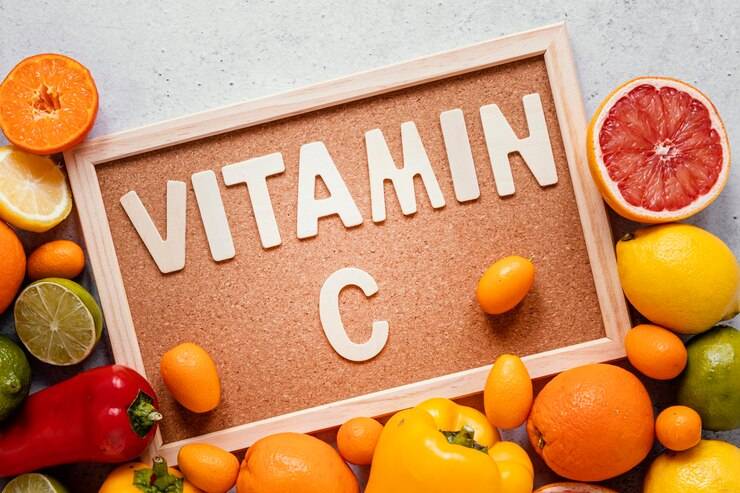
What are The Best Vitamins for Good Health? Suggested by Health Solution.
admin
- 0
- 6
The best vitamins for good health include vitamins A, C, D, E, and B-complex. Adequate intake of these vitamins is essential for optimal body function.
The best vitamins for good health often starts with nutrition, and vitamins play a crucial role in maintaining it. These organic compounds support vision, skin health, immune function, and cell growth. Vitamin A, known for its vision and immune-boosting properties, is vital for overall well-being.
The best vitamins like Vitamin C, an antioxidant, helps in tissue repair and immune system fortification. Vitamin D is essential for bone health and has been linked to mood regulation and immune support. Vitamin E acts as an antioxidant, protecting the body from free radical damage. The range of B vitamins—including B6, B12, thiamine, riboflavin, and niacin—contribute to energy levels, brain function, and cell metabolism. Ensuring a balanced diet or considering supplementation can help fulfill your nutritional needs for these essential vitamins, promoting overall health and preventing deficiencies.
Table of Contents
ToggleThe Importance Of Vitamins For Good Health
Vitamins are essential micronutrients that play pivotal roles in maintaining optimum health. They support various functions in the body, ranging from converting food into energy, repairing cellular damage, to bolstering the immune system. A diet rich in essential vitamins is crucial for warding off diseases and enabling the body to function at its best. Understanding which vitamins are vital and their roles can empower individuals to make informed choices about their nutrition and overall wellness.
Understanding The Role Of Vitamins In Health
Best Vitamins are Categorised into two types: fat-soluble and water-soluble. Fat-soluble vitamins, such as Vitamins A, D, E, and K, are stored in the body’s fatty tissue and liver. They are best absorbed when taken with food that contains fat. On the other hand, water-soluble vitamins including the B-complex group and Vitamin C, need to be replenished daily as they are not stored in the body.
Each vitamin has a specific role in maintaining bodily functions:
- Vitamin A – crucial for eye health and immune function.
- Vitamin B – a group of vitamins that aid in energy production and the synthesis of DNA.
- Vitamin C – necessary for collagen production and has antioxidant properties.
- Vitamin D – helps with calcium absorption and promotes bone health.
- Vitamin E – serves as an antioxidant and protects cells from damage.
- Vitamin K – essential for blood clotting and bone metabolism.
Knowing the right balance and sources of these vitamins is essential for promoting overall health. Natural sources such as fruits, vegetables, lean meats, and whole grains are preferred for their high nutrient content. However, dietary supplements can also provide necessary vitamins, especially when diet alone is insufficient.
| Vitamin | Food Sources |
|---|---|
| A | Carrots, sweet potatoes, spinach |
| B | Whole grains, eggs, legumes |
| C | Citrus fruits, peppers, broccoli |
| D | Fatty fish, fortified dairy products, sunlight |
| E | Nuts, seeds, vegetable oils |
| K | Green leafy vegetables, soybeans, pumpkins |
Beyond the source, the bioavailability of vitamins – how well they can be absorbed and used by the body – affects health. For instance, Vitamin D synthesis relies on exposure to sunlight, and factors like skin pigmentation and sunscreen use can influence how much of this vitamin is produced.
In summary, maintaining a diverse and balanced diet is key to ensuring an adequate intake of these essential nutrients for good health. With careful attention to vitamin intake, individuals can promote their well-being and prevent nutritional deficiencies.
Vitamin A: Vision And Immune System Support
Vitamin A plays a crucial role in maintaining healthy vision, supporting the immune system, and promoting normal organ function. This essential micronutrient is involved in several bodily processes, making it a pivotal component of a well-rounded diet. Understanding the significance of Vitamin A and recognizing the best dietary sources can help individuals optimize their intake for better overall health.
Sources Of Vitamin A
To maintain optimal levels of Vitamin A, incorporating a variety of foods rich in this vitamin is essential. There are two types of Vitamin A available in the human diet:
- Preformed Vitamin A (retinol): Found in animal products such as dairy, fish, and meat.
- Provitamin A (beta-carotene): Found in plant-based foods such as fruits and vegetables.
The best dietary sources of Vitamin A include:
- Liver and fish oils
- Leafy green vegetables like kale and spinach
- Orange and yellow vegetables like carrots, sweet potatoes, and pumpkin
- Tomatoes
- Fruits such as mangoes, apricots, and cantaloupe
- Dairy products like milk, cheese, and butter
- Eggs
Fortified foods, such as breakfast cereals and some types of milk, can also be good sources of Vitamin A, helping to improve daily intake.
Impact Of Vitamin A Deficiency
Vitamin A deficiency can lead to serious health problems. The early symptoms of deficiency might include dry skin, hair loss, and brittle nails. However, the long-term consequences are more severe.
| Deficiency Symptoms | Consequences |
|---|---|
| Night Blindness | Poor vision in low light conditions |
| Xerophthalmia | Drying, thickening, and clouding of the cornea, which can lead to blindness |
| Decreased Immune Function | Increase in frequency and severity of infections |
| Stunted Growth | Impairment in normal growth and development in children |
Overcoming Vitamin A deficiency requires enhancing dietary intake of rich sources and, in some cases, supplementation under the guidance of a healthcare professional.
Regular consumption of Vitamin A-rich foods ensures the maintenance of healthy vision, robust immune function, and overall vitality. Recognizing the critical impact of this nutrient is the first step in taking charge of one’s health and preventing the negative effects associated with its scarcity.
Vitamin C: Antioxidant And Immune Function
Vitamin C, also known as ascorbic acid, stands as a cornerstone in the citadel of nutrients essential for good health. This water-soluble vitamin is celebrated for its potent antioxidant properties and a pivotal role in immune function. Not only does it combat the stress of oxidative damage from free radicals, but it also supports various cellular functions of the body’s immune system. Let’s delve into the sources rich in Vitamin C and unravel its benefits for overall wellness.
Foods High In Vitamin C
Vitamin C abounds in an impressive array of foods that fit seamlessly into a myriad of diets and lifestyle choices. Here are some nutrient-packed champions:
- Citrus fruits like oranges, lemons, and grapefruits
- Cruciferous vegetables such as broccoli, Brussels sprouts, and cauliflower
- Berries like strawberries, raspberries, and blueberries
- Tomatoes and tomato juice
- Peppers – bell peppers, for instance, are extraordinarily high in vitamin C
- Kiwi, Papaya, and Mango
- Leafy greens including spinach, kale, and turnip greens
Benefits Of Vitamin C For Overall Wellness
Ingesting enough Vitamin C works wonders for the body’s overall wellness:
- Supports Immune Health: It encourages the production of white blood cells, aiding in protecting the body against infections.
- Enhances Iron Absorption: It improves the absorption of iron from plant-based foods, which is crucial for reducing the risk of anemia.
- Skin Health: It contributes to collagen production, which is vital for the healing and health of the skin.
- Antioxidant Impact: As an antioxidant, it helps shield the cells from the damage caused by harmful molecules.
- Reduction of Chronic Disease Risk: By neutralizing free radicals, it can reduce inflammation and lower the risk of chronic diseases.
- Helps Prevent Gout: Regular intake is linked with a reduced level of uric acid in the blood and protecting against gout attacks.
- Supports cardiovascular health: Vitamin C intake has been associated with a reduced risk of heart disease.

Vitamin D: Bone Health And Immune Regulation
Vitamin D is not merely a vitamin, it’s a cornerstone for robust health, playing an integral role in bone fortification and the orchestration of the immune system. Known as the “sunshine vitamin,” Vitamin D emerges as a hero in the panorama of micronutrients, essential for calcium absorption and maintaining phosphorus levels in the blood—a duo crucial for bone health. Additionally, this powerhouse nutrient wears another hat; it regulates immune responses and fends off invaders that can potentially compromise our health. The ensuing sections will explore the pivotal ways through which our bodies synthesize Vitamin D and the reverberating impacts of falling short on this essential vitamin.
How The Body Produces Vitamin D
Synthesis of Vitamin D is a marvel of nature, initiated when the skin is graced by the sun’s ultraviolet B (UVB) rays. Cholesterol in the skin cells provides the scaffold for the UVB-driven conversion to produce Vitamin D3, the form of vitamin D that’s biologically active in our bodies. This process underscores the importance of adequate sun exposure for maintaining good health.
- Sun exposure: The skin generates Vitamin D when exposed to sunlight.
- Cholesterol function: Acts as a precursor in the synthesis of Vitamin D.
- D3 importance: The active form that aids in calcium absorption.
The Impact Of Vitamin D Deficiency
Plunging levels of Vitamin D can wreak havoc on the body, manifesting a spectrum of health concerns. A deficiency might go unnoticed but its effects are profound, often snowballing over time.
| Bones | Immunity | Overall Health |
|---|---|---|
| Rickets in children, osteomalacia and osteoporosis in adults | Increased susceptibility to infection | Higher risk for several chronic diseases |
With bones becoming fragile, the risk of fractures escalates. Moreover, an unguarded immune system and amplified vulnerability to infections tan the vitality of this vitamin. Left unchecked, Vitamin D deficiency can forebode more severe health issues, including cardiovascular diseases and certain types of cancer. Ensuring adequate Vitamin D levels is paramount for maintaining a defense system that’s both resilient and responsive.
Vitamin B12: Energy Production And Nervous System Health
Among the essential nutrients for human health, Vitamin B12 deserves special attention. Known as cobalamin, Vitamin B12 plays a pivotal role in energy production and the maintenance of the nervous system. Without adequate levels, individuals might find themselves battling fatigue and a variety of neurological impairments. Let’s delve into the significance of this nutrient in our daily metabolic processes and understand the impacts of its deficiency on our health.
Role Of Vitamin B12 In Metabolism
Central to the metabolic functions of the body, Vitamin B12 is a core component in the conversion of carbohydrates, fats, and proteins into energy. It is especially crucial for:
- The synthesis of DNA during cell division
- Formation of red blood cells in bone marrow
- Maintenance of neuronal health and myelin sheath integrity
- Conversion of homocysteine into methionine which has numerous systemic benefits
By enabling these vital metabolic pathways, Vitamin B12 ensures that the body has the requisite energy levels and that its cellular processes operate with precision.
Consequences Of Vitamin B12 Deficiency
Ignoring the consumption of adequate Vitamin B12 can lead to notable health complications. Deficiency symptoms could include:
| Symptom | Consequence |
|---|---|
| Fatigue | Lowers energy levels impacting daily activities |
| Weakness | Affects muscle function and stability |
| Neuropathy | Results in tingling and numbness in the hands and feet |
| Cognitive impairments | Leads to difficulties with memory, understanding, and judgment |
| Anemia | Triggers issues related to lower red blood cell production |
Long-term neglect could further escalate these issues, culminating in irreversible damage, particularly to the nervous system and brain. Thus, understanding and preventing Vitamin B12 deficiency is fundamental to maintaining robust health and wellbeing.
Supplements And Recommended Daily Allowances
Navigating the world of vitamins and supplements can be a dizzying task. Identifying the right balance of vitamins for good health is essential, as they play a critical role in the body’s overall function and well-being. While a well-rounded diet is the best way to obtain these nutrients, supplements can be valuable allies in addressing nutritional deficits. This section examines the role supplements play in a balanced diet and demystifies the Recommended Daily Allowances (RDAs) for key vitamins to help you ensure your body gets everything it needs.
The Role Of Supplements In Filling Nutritional Gaps
While the ideal scenario is to absorb vitamins and minerals through a healthy and diverse diet, reality often falls short. Factors such as lifestyle, dietary restrictions, health conditions, and even soil depletion can lead to certain nutritional gaps. That’s where supplements come in. They act as a backup plan, ensuring that your body does not suffer from deficiencies that could lead to health issues.
- Multivitamins: These combine several vitamins and minerals that are essential for daily function.
- Individual supplements: Tailored to specific needs, these provide single nutrients like Vitamin D or Iron.
- Specialty blends: Designed for particular demographics such as prenatal vitamins for expectant mothers or formulas targeting age-related concerns.
Understanding Recommended Daily Allowances For Vitamins
The Recommended Daily Allowances (RDAs) represent the average daily dietary intake level that is sufficient to meet the nutrient requirements of nearly all (97-98%) healthy individuals in a particular life stage and gender group. Adjacent to RDAs, Adequate Intakes (AIs) are set when there is not enough evidence to establish a formal RDA. The AIs are assumed to ensure nutritional adequacy; combined, they are referred to as Dietary Reference Intakes (DRIs).
Navigating these guidelines can ensure that supplementation is both safe and effective. Overconsumption of certain vitamins can be harmful, underscoring the importance of understanding these recommendations.
| Vitamin | RDA or AI | Key Functions |
|---|---|---|
| Vitamin A | 900mcg for men, 700mcg for women | Important for vision and immune function |
| Vitamin C | 90mg for men, 75mg for women | Antioxidant that aids in healing and skin health |
| Vitamin D | 15mcg (600 IU) | Essential for bone health and immune function |
| Vitamin E | 15mg | Antioxidant that protects cells from damage |
| Vitamin K | 120mcg for men, 90mcg for women | Key for blood clotting and bone metabolism |
To determine the best course of action when considering supplements, consult with a healthcare professional. They can provide guidance based on individual health profiles and lifestyle considerations.
Frequently Asked Questions On What Vitamins Are Best For Good Health?
Which Vitamins Are Crucial For Immune Health?
Essential vitamins for the immune system include Vitamin C, Vitamin D, and Vitamin E. These support immune defense and reduce vulnerability to illness. They’re found in fruits, vegetables, and supplements.
How Do Vitamins Impact Energy Levels?
B vitamins play a vital role in energy production. Vitamin B12, B6, and B3 help convert food into energy. Deficiencies can lead to fatigue. Ingest them through meats, grains, and dairy for optimal energy.
Can Vitamins Improve Skin Health?
Yes, vitamins like A, C, and E contribute to skin health. They aid in repair, prevent premature aging, and protect against UV damage. Get them from colorful fruits, leafy greens, and nuts.
What Vitamins Assist With Stress And Mood?
Vitamins B6, B12, and D influence mood and stress management. They help produce serotonin and dopamine, which combat depression and anxiety. Incorporate them with a balanced diet or proper supplementation.
Conclusion
Navigating the vast array of vitamins can be daunting. But focusing on key nutrients like vitamins A, C, D, and E, alongside B-complex and magnesium, sets a foundation for vibrant health. Consult with healthcare providers for personalized plans. Remember, balanced diets usually meet most nutritional needs.
Prioritize whole foods for optimal well-being!



